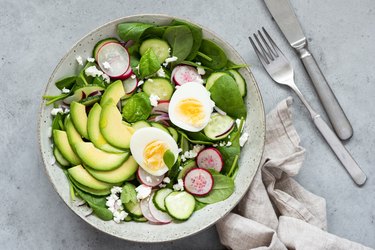
If you want to lose 35 pounds, it can be frustrating to hear that there's no single food that will help you magically lose weight, because every diet and body is unique, But that's also good news, because as long as you follow a few key principles, you have some leeway to choose favorite foods.
What You Should Eat
Video of the Day
For recommendations regarding healthy foods you should eat in your quest to lose 35 pounds, turn to the Department of Health and Human Services Dietary Guidelines for Americans, 2015-2020. They highlight the key principles of a healthy eating pattern, which include:
Video of the Day
- Eat a variety of fruits and vegetables. Choose a variety of colors and types, and aim for whole fruit/vegetables (as opposed to juices) to get the fullest benefit.
- Make at least half of your grain intake whole grains.
- For dairy, focus on fat-free or low-fat products.
- Eat high-quality proteins, including seafood, lean meat and poultry, eggs, legumes, nuts, seeds and soy.
- Use moderate amounts of healthy oils. (The American Heart Association offers a list of healthy cooking oils that are rich in unsaturated fat.)
Tip
What about commercial diets? If a diet meshes well with these principles and also encourages regular exercise, it's a pretty good bet. You can also ask yourself a few important questions to help determine whether a commercial diet suits you.
Remember that you can still gain weight by eating too much good-for-you food. Counting calories is one of the easiest ways to keep your forward momentum toward losing 35 pounds. Start by checking the HHS's chart of estimated calorie needs according to your age, sex and physical activity level. Then keep a diary of everything you eat and drink for a week and see how the numbers match up.
To lose weight, you must consume fewer calories than you take in. The National Heart, Lung and Blood Institute recommends a calorie deficit of 500 to 1,000 calories per day, to lose weight at a rate of 1 to 2 pounds per week.
Read more: Pros and Cons of the 10 Most Popular Diets
Limit (or Exclude) These Foods
There are, of course, a handful of foods (and food types) that you should exclude or limit if you want to lose 35 pounds. As the HHS guidelines explain, these include:
- Saturated fat: Limit this to less than 10 percent of your daily calorie intake.
- Added sugar: Restrict this to less than 10 percent of your daily calories too.
- Sodium: Eat less than 2,300 milligrams of sodium per day.
The HHS also recommends consuming alcohol only in moderation. That means up to one drink per day for women, and up to two drinks per day for men.
With all that said, if you can only focus on cutting one thing out of your diet, make it highly refined foods. That's where the types of foods you most need to cut out — saturated fats, added sugar, sodium and highly refined grains that have been stripped of many nutrients and fiber content — are most likely to lurk.
Drink Water to Lose Weight
If you want to lose weight, drink water. As Harvard Health Publishing points out, water is crucial for every system in your body — including your heart, brain and muscles — and for functions as simple as carrying nutrients to your cells and promoting healthy elimination.
Expert recommendations of how much water you should drink vary. Harvard Health Publishing recommends 30 to 50 ounces per day for most healthy people, while the Cleveland Clinic cites a broader range of recommendations — then goes on to explain there's so much variance because factors such as your body size, activity level and metabolism all affect how much water you need. So does your diet, because many foods contain some water.
So how much water is enough? The Cleveland Clinic recommends checking your "built-in water meter" — your urine. If it's dark yellow or has a strong odor, they say, you need to take in more water.
- Department of Health and Human Services: "Key Elements of Healthy Eating Patterns"
- American Heart Association: "Healthy Cooking Oils"
- Harvard Health Publishing: "The Importance of Staying Hydrated"
- Cleveland Clinic: "Water: Do You Need 8 Glasses a Day?"
- Department of Health and Human Services: "Estimated Calorie Needs per Day by Age, Sex, and Physical Activity Level"
- National Heart, Lung and Blood Institute: "Key Recommendations"
Was this article helpful?
150 Characters Max
0/150
Thank you for sharing!
Thank you for your feedback!